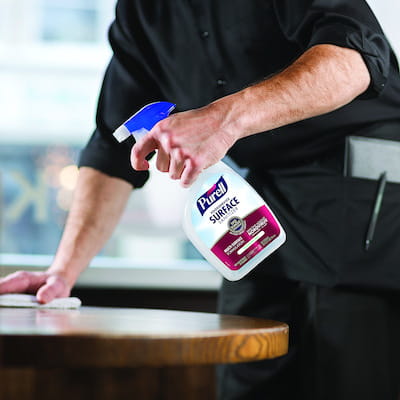Tuesday, May 4, 2021
Outbreaks can be costly – foodservice settings must be prepared to protect their business and reputation

Norovirus outbreaks declined by over 80% between April and July of 2020 as compared to the same date range in previous years, according to data reported to the National Outbreak Reporting System (NORS) at the Centers for Disease Control and Prevention (CDC).1 Recent research by the CDC, in the Journal of Infectious Diseases, shows that COVID-19 related control measures, such as social distancing, mask-wearing, surface disinfection, and increased hand hygiene, may be primarily responsible for this decrease. Likewise, these control measures have also been suggested to have reduced the incidence of influenza in the United States and other countries, as significant drops in illnesses and deaths in the United States have been observed during the pandemic.2
Every year, nearly 60% of all foodborne related illness can be traced to norovirus,3 with most of these outbreaks occurring in foodservice settings, like restaurants4 – where the virus can live on surfaces for weeks.5 Outbreaks can result in serious illness for employees and customers, and can carry significant financial and public confidence implications for the establishment. One study showed a single foodborne incident could cost a restaurant thousands of dollars – or even millions if there are legal fees, lawsuits, and fines.6
“Retail and foodservice establishments need to consider the benefit of adopting some of these mitigation measures as long-term best practices and Standard Operating Procedures (SOPs) to control foodborne illnesses, such as norovirus,” said Hal King, Ph.D., Managing Partner, Active Food Safety and Founder/CEO, Public Health Innovations. “Recently, the CDC shared updated guidance on surface disinfection in indoor community environments during the COVID-19 pandemic that has caused some confusing headlines in the media. It’s important that the food industry does not let up on their focus to clean and disinfect high-touch surfaces. Many foodborne diseases, especially norovirus, can be transmitted from surfaces to persons and then to hands, where cross-contamination of food can occur.”
Implementing preventative measures now can help establishments avoid serious consequences later. Turnkey programs such as the "NOROVIRUS HOT SPOT™ + COVID-19 Program" from Active Food Safety, in partnership with the PURELL® brand, offer a disinfectant combined with a set of procedures and SOPs that a facility can quickly adopt and integrate into their food safety plan. The principles of the NOROVIRUS HOT SPOT™ + COVID-19 Program will prepare the business not only for the risk of norovirus outbreaks but for other pathogens that could spread on high-touch surfaces, as well.
The NOROVIRUS HOT SPOT™ + COVID-19 Program is based on research that included findings from a comprehensive risk assessment study conducted by the FDA to track norovirus transmission on various surfaces throughout dining establishments. It focuses on ways transmission begins in restaurant restrooms and quickly travels to other hot spot surfaces in the kitchen and dining room.7
Learn more about norovirus, as well as prevention solutions, with the latest research and insights, by signing up to download this new bulletin.
To find out more about the NOROVIRUS HOT SPOT™ + COVID-19 Program, please visit the portal here.